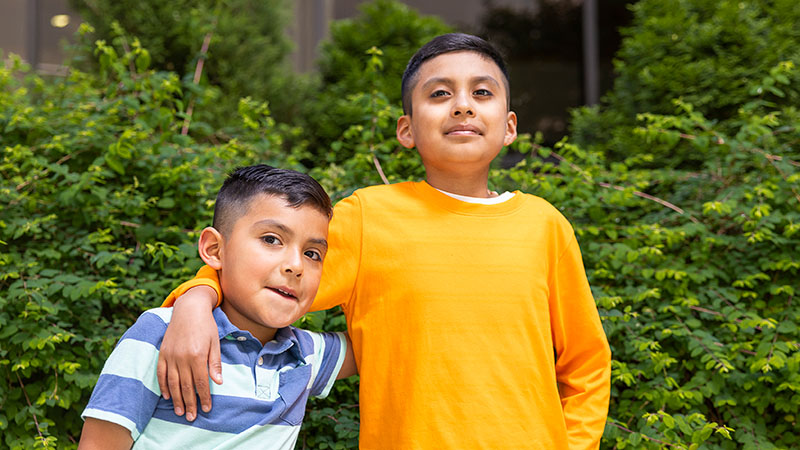Your Child’s Mental Wellness: 5 Actions You Can Take
5.23.2025 | Heather Cooper
You, like most parents and caregivers, are likely aware of the youth mental health crisis. You know it’s important to support your child or teen’s mental wellness. But it can be hard to know exactly what actions you can take to do that. Seattle Children’s is here to help! Our experts share easy actions you can add to your parenting routines to promote your child’s mental wellness.
Check In on Your Child’s Mental Health
 Mental health check-ins can be a part of everyday conversation with your child. It’s part of what you’re doing when you’re chatting with them on the way to school, or when you’re asking about their day during dinner. You’re getting a read on their feelings, thoughts and mood. This is best done by paying attention to what they say, how they say it, and the body language they use.
Mental health check-ins can be a part of everyday conversation with your child. It’s part of what you’re doing when you’re chatting with them on the way to school, or when you’re asking about their day during dinner. You’re getting a read on their feelings, thoughts and mood. This is best done by paying attention to what they say, how they say it, and the body language they use.
You know your child best, so choose your timing wisely when doing these check-ins. Some kids need time and space right after school. If you have a child or teen like that, it’s best to wait a bit before asking about the highs and lows of their day.
One tip to keep in mind is to avoid jumping from question to question, and from topic to topic. This can make it feel like you’re digging for information. Kids and teens can find this exhausting and irritating, and they’ll likely shut down. Start with an open-ended question, and truly listen to the answer.
If your child shares issues, disappointments or problems, listen more than you talk. When kids and teens are asked how they want to be supported, they most often say they just want their parent to listen, believe them and try to understand. It’s OK to ask things like, “How did that make you feel?” or “What helped you move through the rest of lunchtime?” Most of the time, they aren’t looking for an answer or a solution to their problem. It’s OK to ask them if they want your help brainstorming solutions but let them decide. The simple act of sharing or venting can be a healthy release, especially when you validate their feelings.
Learn more about mental health check-ins.
Support Your Child in Getting Quality Sleep and Enough Active Play or Exercise
Getting enough quality sleep, having healthy eating habits, and getting enough active play or exercise each day supports your child’s mental wellness. Teach your child or teen that taking care of these basics can have a positive impact on their mood. Work together to help them get the sleep and exercise they need:
Sleep guidelines:
- Preschool-age kids (3 to 5 years) need 10 to 13 hours, including naps.
- School-age kids (6 to 13) need 9 to 12 hours.
- Teens (14 to 17) need 8 to 10 hours of sleep nightly.
Exercise and active play guidelines:
- Preschoolers should get at least 2 hours (120 minutes) of active play each day. Your preschooler should play every hour throughout the day for about 15 minutes at a time.
- Grade-school children and teens need to be active at least 1 hour (60 minutes) each day. It’s OK to break activity into 10- or 15-minute segments, rather than doing it all at one time.
Share Ways to Reduce Stress
It’s impossible to completely avoid stress, but it is possible to reduce stress and find healthy ways to cope with it. Find what works for you – your child may pick up on the same things. You can also give them other ideas, such as:
- Be creative with arts, crafts or music.
- Play with a pet – borrow one if you don’t have your own.
- Read or journal.
- Be out in nature.
- Help others.
- Play a game or sport.
- Stargaze or look for satellites.
- Meet up with a friend.
- Turn on music.
- Build something.
- Clean or organize your space.
- Cook.
- Take a bath or shower.
- Learn something new.
Check out these mindfulness and visualization exercises for more ways to relax.
Ask the Question
Many parents and caregivers are surprised to learn that suicide is the second-leading cause of death for people ages 10 to 24. Thoughts of suicide, also called suicide ideation, are common among youth.
Learn how to ask your child or teen if they’re thinking about suicide. Knowing how to ask and how to respond makes it easier. As with so many other things, asking gets easier with practice. Try role playing with a friend or partner. Practice both asking the question and what to say if your child’s answer is “yes.”
Know that asking about suicidal thoughts won’t put the idea in your child or teen’s head. Asking can provide relief to someone who is struggling and can be the difference between life and death. Asking is an act of love.
Know Your Resources
Your child’s doctor can help if you’re concerned about your child or teen’s mental health. The resources below may be useful to your family at some point during your child’s youth, or you can share them with others to help spread awareness. Parenting is rewarding and parenting is hard work – everyone needs support, community and resources along the way.
- Seattle Children’s Mental Health Resource Hub
- Seattle Children’s Positive Parenting resource page
- Seattle Children’s Psychiatric Urgent Care
- Washington’s Mental Health Referral Service for Children and Teens
- Finding Mental Health Care in Washington State: A Class on Where to Start
- Behavior Basics Parenting Class
- Youth Mental Health First Aid Class
- Hotlines for Youth
- 988 Suicide & Crisis Lifeline

